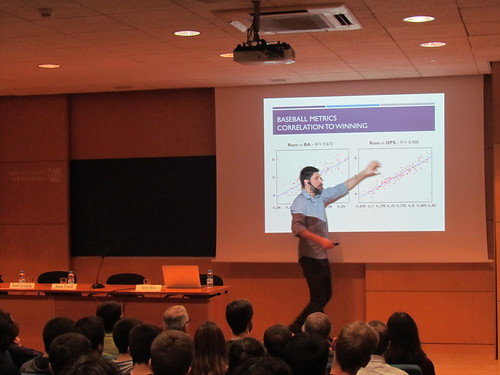Gravació i fotos de la conferència "Quantitative Methods in Sports: Evolution and Application" a càrrec de Sergi Oliva, Director of Analytics & Strategy at the Philadelphia 76ers
La conferència va tenir lloc divendres 16 de febrer a les 12.30 h a la sala d'actes de l'FME, coorganitzada amb la FIB i la ETSETB en el marc del Grau en Ciència i Enginyeria de Dades de la UPC.
He is also a regular collaborator of the Catalan Basketball Federation (FCBQ), particularly as a lecturer in their coaching certification courses.
For futher information about Sergi, you can read recent interviews: here and here.
Gravació de l'acte (canal YouTube FME)
Recull de fotos de l'acte
Abstract of the talk:
Starting with Baseball in the 90s, quantitative methods have creeped their way into all levels of decision-making in professional sports organizations. Even though this evolution has taken different forms and speeds depending on the sport or league, most have shared several common themes: the incremental availability of richer data sources
fueled by a growing interest in their potential, the challenge in communicating actionable insights to very successful and traditionally-minded industry leaders, and, nonetheless, the overall evolution of the conventional standards towards more analytically-oriented principles.
In this talk, focused primarily but not exclusively in basketball, we will have a brief look at the early stages of the field, before discussing the growth in its data sources, the type of research that was made possible, the transformational effects of some of those results in creating new strategical standards, and the challenges of implementing
quantitative-based insights into the day-to-day decision-making of a sports organization.

Comparteix: